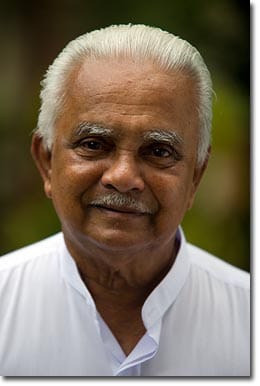Photo via Sarvodaya Sri Lanka
Danny Fisher interviews Dr. A. T. Ariyaratne, one of the most iconic and influential figures in the history of Engaged Buddhism.
Saturday, November 5, marked the eightieth birthday of Dr. A.T. Ariyaratne — one of the most iconic and influential figures in the history of Engaged Buddhism. Though he was very busy this weekend as the center of celebrations, he graciously took some time to answer questions from me about the occasion of his birthday as well as his life of Buddhist-inspired service.
Also known as Sri Lanka’s “Little Gandhi,” Dr. Ariyaratne is the founder and president of the Sarvodaya Shramadana Movement, a grassroots movement dedicated to the “sustainable empowerment” of rural Sri Lankans “through self-help and collective support, to non-violence and peace.” Today, Sarvodaya is the largest NGO in Sri Lanka, actively benefiting over 15,000 of Sri Lanka’s nearly 40,000 villages.
Among the various honors Dr. Ariyaratne has received for his many years of service are the Niwano Peace Prize, the Gandhi Peace Prize, and the King Beaudoin Award. In addition, he was a nominee for the Nobel Peace Prize in 2005.
Our conversation follows.
Happy Birthday, Dr. Ari! You are turning 80 years old this week — that’s certainly a milestone! For most of those eighty years, you’ve actively been involved in engaged Buddhist work. Would you share with us some of the important lessons you’ve learned over the years about Buddhist practice and being of service to others? Drawing on all your experience, what advice or guidance would you offer young people starting Buddhist service projects today?
As I complete 80 years of my sojourn on this planet, I feel quite healthy physically as well as mentally, compared to some others at my age. What is more important is my spiritual health, which is better than ever before.
The three causes of greed, aversion, and ignorance, which result in all kinds of suffering, can only be encountered if one keeps in mind the three principles which the Buddha taught us: namely, impermanence, suffering, and egolessness. When I started my active social service and community development work, I was still a student. So, for over 66 years, I learned the lesson that the services rendered to human and other living beings in a very detached way result in reducing your egocentricity, physical and mental suffering, and controls your acquisitive state almost completely.
So today, at 80, I do not possess any land or such material or financial wealth. In my mind, though, I may still have some mental possessions. During the remaining few years of my life, I am trying very hard to get rid of these mental possessions I have; one’s commitment to serve the world should spiritually enrich people in this way, and not vice versa. So I advise the young generation to always serve the world so as to remove the causes that lead to spiritual and material poverty, as well as inequities and violence. You should always keep in mind that your internal engagements should make others happy, and internally reduce your greed, avarice, and ignorance.
Congratulations also on your recent Basava Sree Award! This is the latest in a long series of awards and acknowledgments you have received for your work with the Sarvodaya Shramadana Movement in Sri Lanka. What do you feel have been the most significant contributions of Sarvodaya? What are your hopes for it in the future?
I believe that the Sarvodaya Shramadana Movement has educated the entire country that material and spiritual development should take place simultaneously if the whole society is to progress in peace. I hope that the Deshodaya, or the national awakening movement, which is the latest phase of the evolution of the Sarvodaya idea, will result in converting Sri Lanka into a land of plenty and righteousness based on self-governing village republics in all rural and urban communities.
Lastly, please teach us: What is something that each and every one of us can do right now to help ensure the welfare of all people?
Start and end the day with a meditation on loving kindness towards all beings. Every moment, while you are awake, do whatever you do with right mindfulness. If these two forms of spiritual exercises can be developed with our own personality, then the contribution we can make for the well being of humanity will simultaneously take place.
